
This video excels at describing and highlighting the anatomy of scholarly articles and their value to readers.
Consider the following points when reading a scholarly article:
An abstract is a summary of the main article. An abstract will include information about why the research study was done, what the methodology was and something about the findings of the author(s). The abstract is always at the beginning of the article and will either be labeled "abstract" or will be set apart from the rest of the article by a different font or margins.
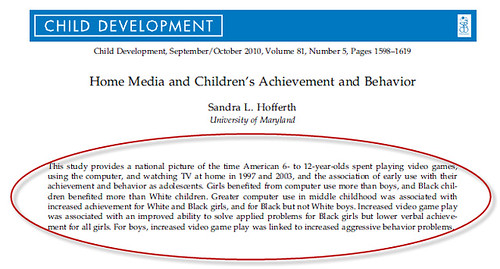
The abstract should tell you what the research study is about, how the research was done (methodology), who the research sample was, what the authors found and why this is important to the field.
Most articles will start with an introductory section, which may be labeled introduction. This section introduces the research study, the thesis statement and why the research being conducted is important.
Questions to ask while you read:

The literature review section of an article is a summary or analysis of all the research the author read before doing his/her own research. This section may be part of the introduction or in a section called Background. It provides the background on who has done related research, what that research has or has not uncovered and how the current research contributes to the conversation on the topic. When you read the lit review ask:
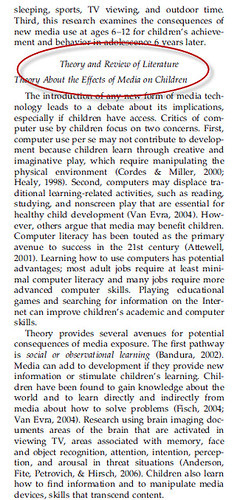
The lit review is also a good place to find other sources you may want to read on this topic to help you get the bigger picture.
The methodology section or methods section tells you how the author(s) went about doing their research. It should let you know a) what method they used to gather data (survey, interviews, experiments, etc.), why they chose this method, and what the limitations are to this method.
The methodology section should be detailed enough that another researcher could replicate the study described. When you read the methodology or methods section:
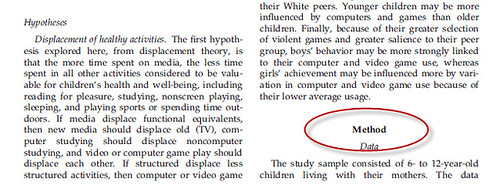
A good researcher will always let you know about the limitations of his or her research.
The results section in a scholarly article is where the author(s) talk about what they found in their research study. Most scholarly articles will have a section labeled results or findings.
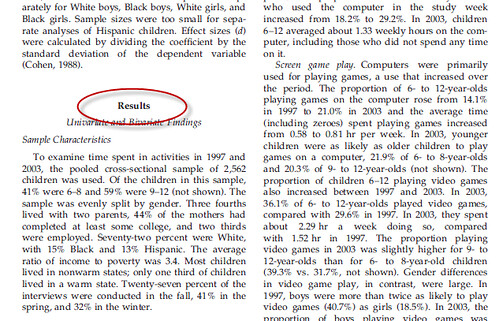
Research articles are full of data. The data should be complete and directly support the conclusions the authors' draw about their research question.
Tables, graphs, and charts are good indicators that this is a research article. The tables should represent the data in a clear and readable manner.
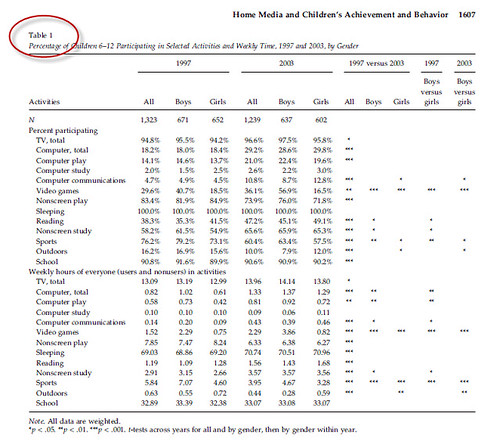
The discussion section is where the author(s) write about what they found and what they think it means. The authors may also draw some conclusions about the research and what significance it has in this section. This section will also tell you what some of the issues were with the research or using a specific population for a research study.

The final section is usually called the conclusion or recommendations. Here is where the authors summarize what they found, why they think their research is significant and, if appropriate, make recommendations about future actions or future research that needs to be conducted. In some cases, the conclusion is part of the discussion section.
At the end of a scholarly article, you will find a list of the works cited by the author(s). This list is called a reference list, works cited or bibliography. In scholarly articles, this list will generally be quite long and include articles, books, and other sources.
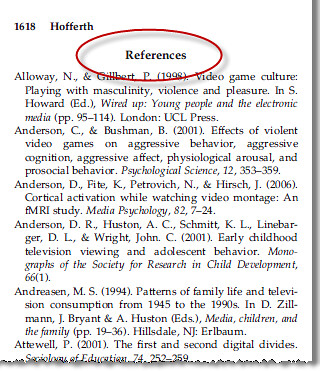
When you look at the references, take a look at the dates of the articles and books listed. Are they recent? Does this list include both historic and current articles? If you know something about the topic, do you recognize any of the authors listed?
 This box is from Oregon State University's Orientation to Fisheries and Wildlife LibGuide and is licensed under a Creative Commons Attribution NonCommercial 4.0 International License.
This box is from Oregon State University's Orientation to Fisheries and Wildlife LibGuide and is licensed under a Creative Commons Attribution NonCommercial 4.0 International License.
| Category | Scholarly | Trade | Popular |
|---|---|---|---|
| Author | Researchers, scholars, and experts | People in the field, specialized journalists | Journalists |
| Length | longer, in-depth articles | some lengthy, mostly shorter articles | short, a few pages at most |
| Language | uses vocabulary of the discipline | uses the jargon of the field | simple, general vocabulary |
| Publisher | university & scholarly presses, professional organizations | professional organizations and trade publishers | commercial and trade publishers |
| Sources | bibliography always included | usually cited, not as extensive | generally, no citations |
| Graphics | charts, tables, almost no advertisements | some illustrations & ads related to the profession | lots of photographs and advertisements |
| Intended Value | to share original research with other scholars | trends, news and information for the field | current events, news, popular culture, and entertainment |
| Examples | Foreign Affairs, Journal of Educational Psychology, American Economic Review | Farm Industry News, Automotive News, Library Journal | Time, Newsweek, People, US News & World Report |
Finding Scholarly/Academic Articles
To locate scholarly/academic articles, your best bet is to look in one of our databases or use WorldCat Discovery and limit your search to articles. You will likely find that there are LOTS of popular sources in with the academic ones, even within our databases. Use the Peer-Review Limiter to your advantage. This option is normally located in the left column; you can see screenshots of this option from WorldCat Discovery (left) and our EBSCO databases (right).


This will limit your search to publications that are most scholarly/academic. It does not necessarily filter to include publications that go through a strict peer-review process. It also does not apply the filter at the article level; occasionally it will allows articles that are not scholarly/academic to come through (for example, an editorial opinion piece can be published in a scholarly journal but the article itself is not scholarly).
If you have questions about whether or not a source is scholarly/academic, ask your professor or a librarian!
Library Hours
Study Rooms
My Library Account
Library Website


